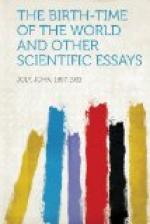[2] De Rerum Natura, translated by H. A. J. Munro (Cambridge, 1886).
1
poets first sang upon the earth. Modern Science has along with the theory that the Earth dated its beginning with the advent of man, swept utterly away this beautiful imagining. We can, indeed, find no beginning of the world. We trace back events and come to barriers which close our vista—barriers which, for all we know, may for ever close it. They stand like the gates of ivory and of horn; portals from which only dreams proceed; and Science cannot as yet say of this or that dream if it proceeds from the gate of horn or from that of ivory.
In short, of the Earth’s origin we have no certain knowledge; nor can we assign any date to it. Possibly its formation was an event so gradual that the beginning was spread over immense periods. We can only trace the history back to certain events which may with considerable certainty be regarded as ushering in our geological era.
Notwithstanding our limitations, the date of the birth-time of our geological era is the most important date in Science. For in taking into our minds the spacious history of the universe, the world’s age must play the part of time-unit upon which all our conceptions depend. If we date the geological history of the Earth by thousands of years, as did our forerunners, we must shape our ideas of planetary time accordingly; and the duration of our solar system, and of the heavens, becomes comparable with that of the dynasties of ancient nations. If by millions of years, the sun and stars are proportionately venerable. If by hundreds or thousands of millions of
2
years the human mind must consent to correspondingly vast epochs for the duration of material changes. The geological age plays the same part in our views of the duration of the universe as the Earth’s orbital radius does in our views of the immensity of space. Lucretius knew nothing of our time-unit: his unit was the life of a man. So also he knew nothing of our space-unit, and he marvels that so small a body as the sun can shed so much, heat and light upon the Earth.
A study of the rocks shows us that the world was not always what it now is and long has been. We live in an epoch of denudation. The rains and frosts disintegrate the hills; and the rivers roll to the sea the finely divided particles into which they have been resolved; as well as the salts which have been leached from them. The sediments collect near the coasts of the continents; the dissolved matter mingles with the general ocean. The geologist has measured and mapped these deposits and traced them back into the past, layer by layer. He finds them ever the same; sandstones, slates, limestones, etc. But one thing is not the same. Life grows ever less diversified in character as the sediments are traced downwards. Mammals and birds, reptiles, amphibians, fishes, die out successively in the past; and barren sediments ultimately succeed, leaving the first beginnings of life undecipherable. Beneath these barren sediments lie rocks collectively differing in character from those above: mainly volcanic or poured out from fissures in




